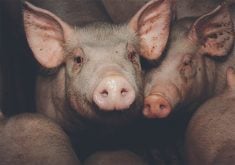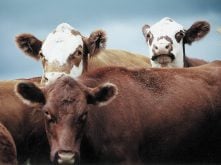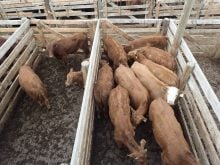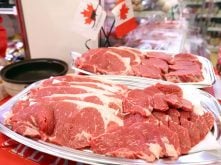The new president of the Canadian Cattlemen’s Association says producers understand the important role government plays to support the industry but are still suspicious of too much government.
“I think since 2003 (BSE), there is a clear recognition that the government plays an important role,” northern Alberta rancher Travis Toews said March 29.
“But producers across the country still tend to be an independent lot and would prefer to take their signals from the market and not from what government does.”
Read Also

More factors affecting winter weather
When you combine a weak La Niña, early Siberian snow, and a warm northern Pacific, it’s easy to see why long-range winter forecasting is so complex.
Toews, 45, was elected the 26th president of the CCA during the association’s annual meeting in Ottawa recently. He runs a cow-calf operation, including some backgrounding and a small feedlot, west of Beaverlodge, Alta.
He takes over the presidency after years of border closures, poor returns and pessimism but he says many producers are feeling a bit of optimism these days.
“I would say there are some signs of optimism, largely because cattle numbers are so low in North America,” he said. “When the recession ends, we will be short of cattle and a number of analysts are predicting that we will see some strengthening of prices that will help producers.”
But Toews said producers are cautious about optimistic predictions.
“It has been a tough grind for some years in the cattle industry and when we sometimes have seen glimmers of hope, another issue pops up.”
Cattle producers currently face a number of serious issues, he said.
A Canadian dollar almost at par with the U.S. dollar means that the export-dependent industry is receiving less for cattle it sells priced in American dollars.
“A lot of the industry was capitalized with a dollar between 70 and 80 cents (US) and so this is a problem and it appears we will be operating in a strong dollar environment for some time.”
At the same time, Canada’s primary safety net program is not working well for the industry.
AgriStability requires that a farm operation record a profit in two of three margin reference years to be considered viable. Otherwise, it is not eligible for payouts under the program. Many livestock operations cannot meet that test and become ineligible.
Toews said the CCA will continue to press federal and provincial governments to change or end the viability test and expand coverage of negative margins to make the program work better for producers.
But he is not hopeful that governments will move quickly because it would cost more money.
“I think these are responsible recommendations that would make the program more effective,” he said. “But with governments looking at deficits, I think it is going to be increasingly challenging to see uptake on these recommendations anytime soon. We’ll continue to present these recommendations.”
Toews said export market access remains a key issue for cattle producers, including the American country-of-origin labelling rule.
“We will continue to help the government prepare a case against COOL and in a sense on market access, we are asking our government to convince other governments to get out of the way, to reduce their role in influencing markets.”
He said higher costs of specified risk material removal in Canadian packing plants remains an issue for the industry.
A federal commitment of $75 million to help packers deal with it is helpful “but it is not the full solution. We need more with the long-term goal being harmonization of regulations with the United States.”
Toews was elected to a one-year term with the possibility for as second. He replaced Brad Wildeman of Saskatchewan.














